Group developing self-defence program for women
Advertisement
Read this article for free:
or
Already have an account? Log in here »
To continue reading, please subscribe:
Monthly Digital Subscription
$1 per week for 24 weeks*
- Enjoy unlimited reading on winnipegfreepress.com
- Read the E-Edition, our digital replica newspaper
- Access News Break, our award-winning app
- Play interactive puzzles
*Billed as $4.00 plus GST every four weeks. After 24 weeks, price increases to the regular rate of $19.00 plus GST every four weeks. Offer available to new and qualified returning subscribers only. Cancel any time.
Monthly Digital Subscription
$4.75/week*
- Enjoy unlimited reading on winnipegfreepress.com
- Read the E-Edition, our digital replica newspaper
- Access News Break, our award-winning app
- Play interactive puzzles
*Billed as $19 plus GST every four weeks. Cancel any time.
To continue reading, please subscribe:
Add Free Press access to your Brandon Sun subscription for only an additional
$1 for the first 4 weeks*
*Your next subscription payment will increase by $1.00 and you will be charged $16.99 plus GST for four weeks. After four weeks, your payment will increase to $23.99 plus GST every four weeks.
Read unlimited articles for free today:
or
Already have an account? Log in here »
Hey there, time traveller!
This article was published 17/07/2023 (822 days ago), so information in it may no longer be current.
It shouldn’t be risky to enjoy a night out, go on a date, ride alone in a taxi, park in unlit areas or wear headphones during a walk.
This is the message local organization It Shouldn’t Be Risky (ISBR) wants to send to Canadians.
“I never really feel safe outside. There are certain parts of the city I don’t walk in or places I don’t go,” said Cara Ginter, co-founder of the organization, which equips women and people from marginalized communities with the skills to protect themselves via free self-defence classes.

MIKAELA MACKENZIE / WINNIPEG FREE PRESS
‘Women have the same rights to the street as men do and we shouldn’t have to be afraid of that,‘ says Cara Ginter, president of the course sponsor, It Shouldn’t Be Risky (ISBR).
In Winnipeg last year, there were 1,308 reported cases of sexual assault in Winnipeg, according to the Winnipeg Police Service 2022 Statistical Report.
The report also stated there were 16,590 calls for events of domestic violence in 2022, an overall decrease in comparison to 17,652 in 2021.
Ginter said it’s common for people in society to blame a survivor of gender-based violence rather than holding the perpetrator accountable.
“Every time a woman is assaulted on the street at night, one of the questions people ask is, why was she out at night?” said Ginter. “Women have the same rights to the street as men do and we shouldn’t have to be afraid of that.”
It’s hard to enjoy Winnipeg’s arts and culture scene when you’re feeling hyper-vigilant about your surroundings, said Ginter, who chooses to only go downtown during the middle of the day for safety reasons.
Sixty-four per cent of people in Canada know a woman who has experienced physical, sexual or emotional abuse, according to the Canadian Women’s Foundation.
Corinna Klein, who recently returned to Winnipeg after experiencing gender-based violence 30 years ago, says she feels disappointed when she reflects on her memories of the city.
Klein said she vividly remembers a home invasion in which 12 people broke down her door, smashed her front windows and culminated in a stabbing during her teenage years.
She also remembers being attacked 20 years ago along East Hastings Street in Vancouver by a group of people, leaving her with a leg injury.
“After being attacked, I had five years where I was just constantly looking over my shoulder,” said Klein. “I’m absolutely aware of what’s around me, but I think in (downtown Winnipeg) a lot of stuff is escalated only by violence.”
Klein said she became tired of living in a place filled with murder, gangs and street violence.
After finding out her friend had been stabbed 27 times and nearly decapitated, she made the choice to leave for Europe and become a chef in Turkey and Germany.
Now that she’s moved back to downtown Winnipeg pursuing a business endeavor, she says she’s learned how to be ‘street smart’ but emphasizes the need for people to empathetically communicate with each other and learn de-escalation techniques.
ISBR is in the early development stages of their accessible self-defence programming for women and vulnerable communities across Winnipeg.
They are searching for 10 certified trainers in total and fundraising for those willing to complete the Rape and Aggression Defense (R.A.D.) programming in the U.S.
Ginter said she firmly believes women have the right to pursue their goals and live their life free from the fear of violence. She hopes the programming will provide participants with the necessary skills to assess unsafe situations and defend themselves against physical harm.
Classes will run for one hour in community centres across the city based on the availability and location of registrants in the program with the goal of beginning in October or November.
R.A.D trainers recommend people to take up to 12 classes to build their level of confidence and understanding in self-defence.
With the rising costs due to inflation, Ginter said most people don’t have the extra money to register for self-defence classes, which is why ISBR offers free classes to remove any barriers impacting people’s ability to take the program.
The province has also promised to spend $10 million over two years on a new strategy to make downtown Winnipeg safer, adding 24 police officers to patrol the area, 75 more closed-circuit television cameras and a new community safety office.
This plan is a part of the province’s $52-million violent crime strategy.
tessa.adamski@freepress.mb.ca

